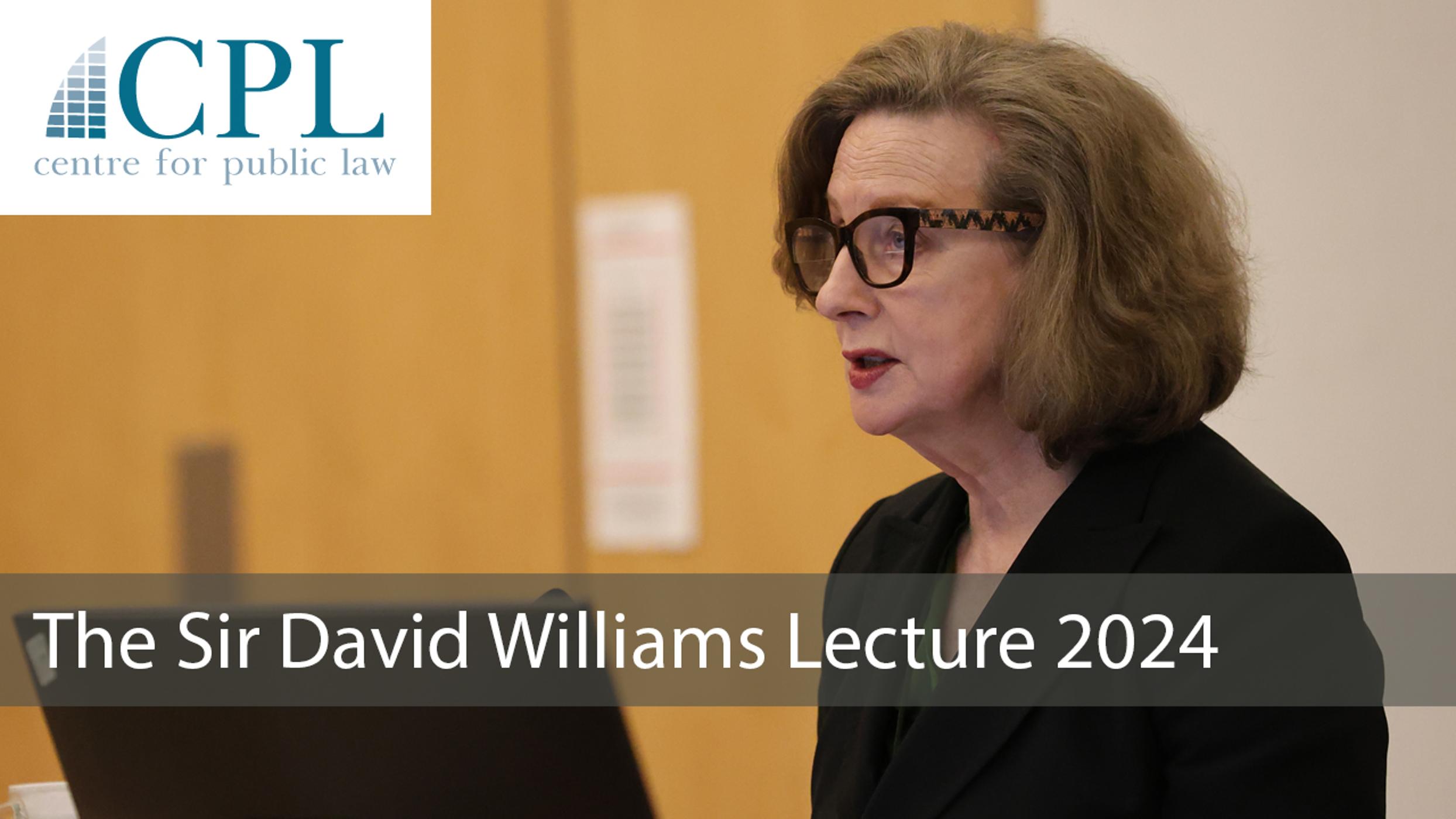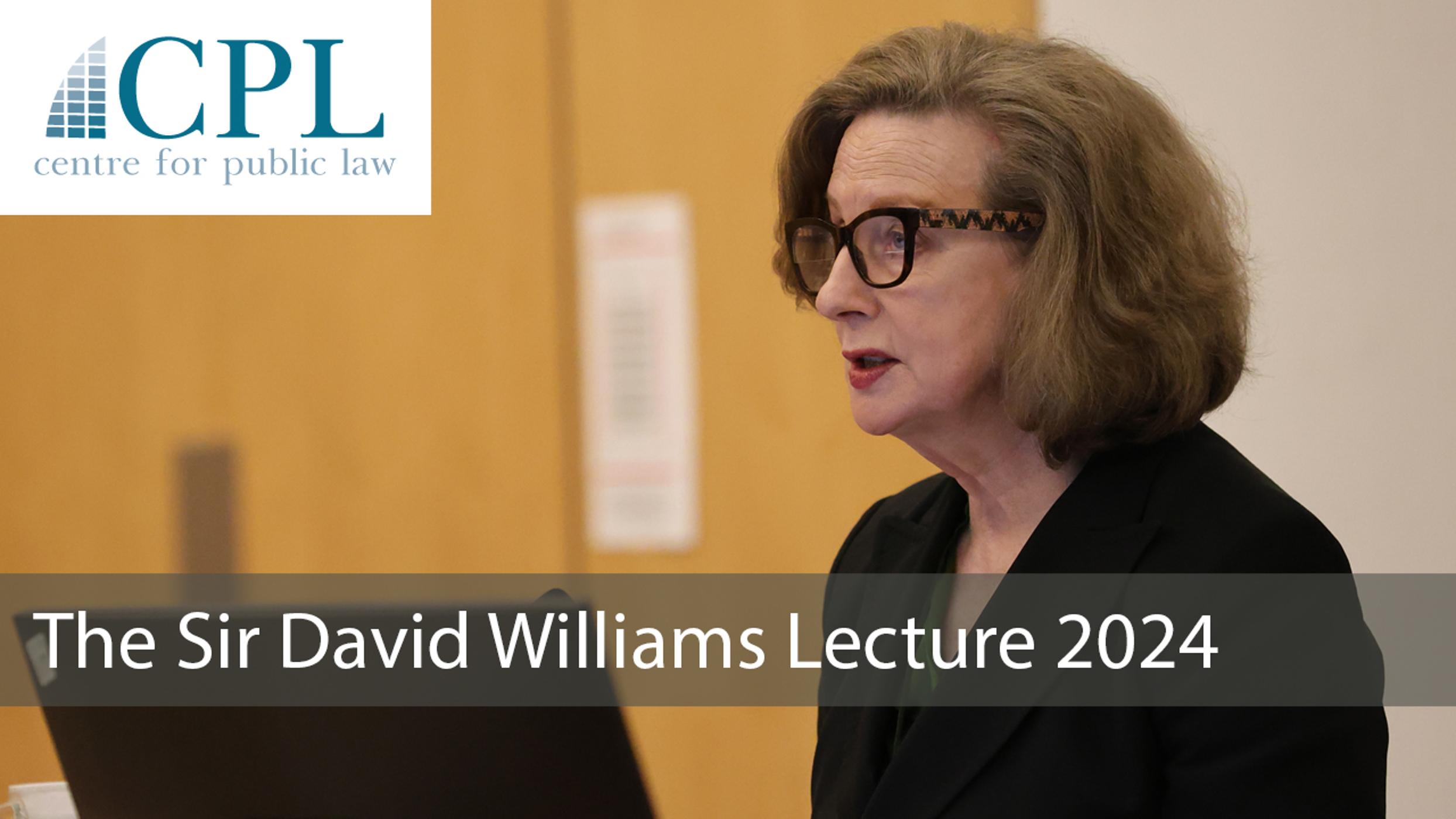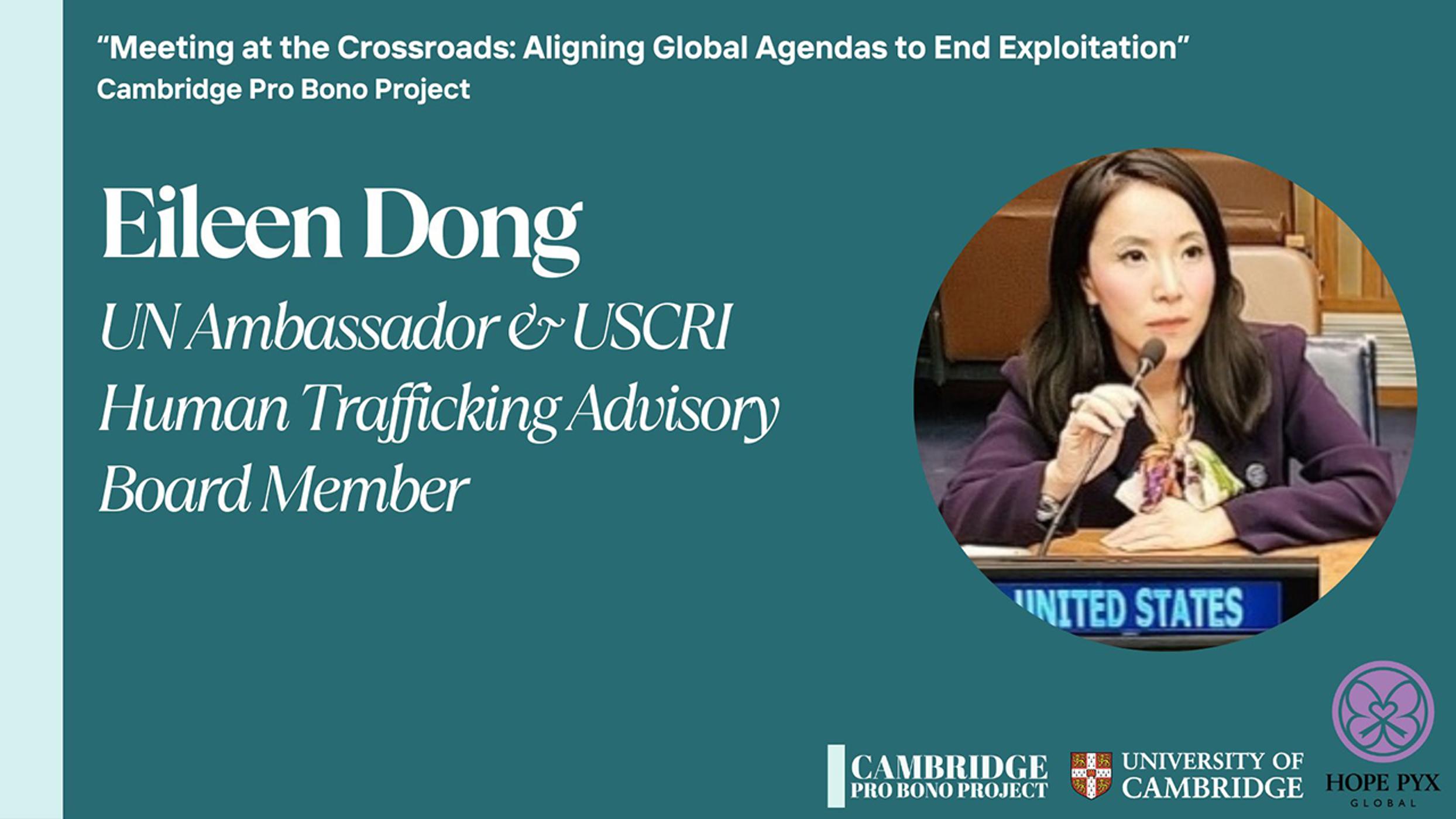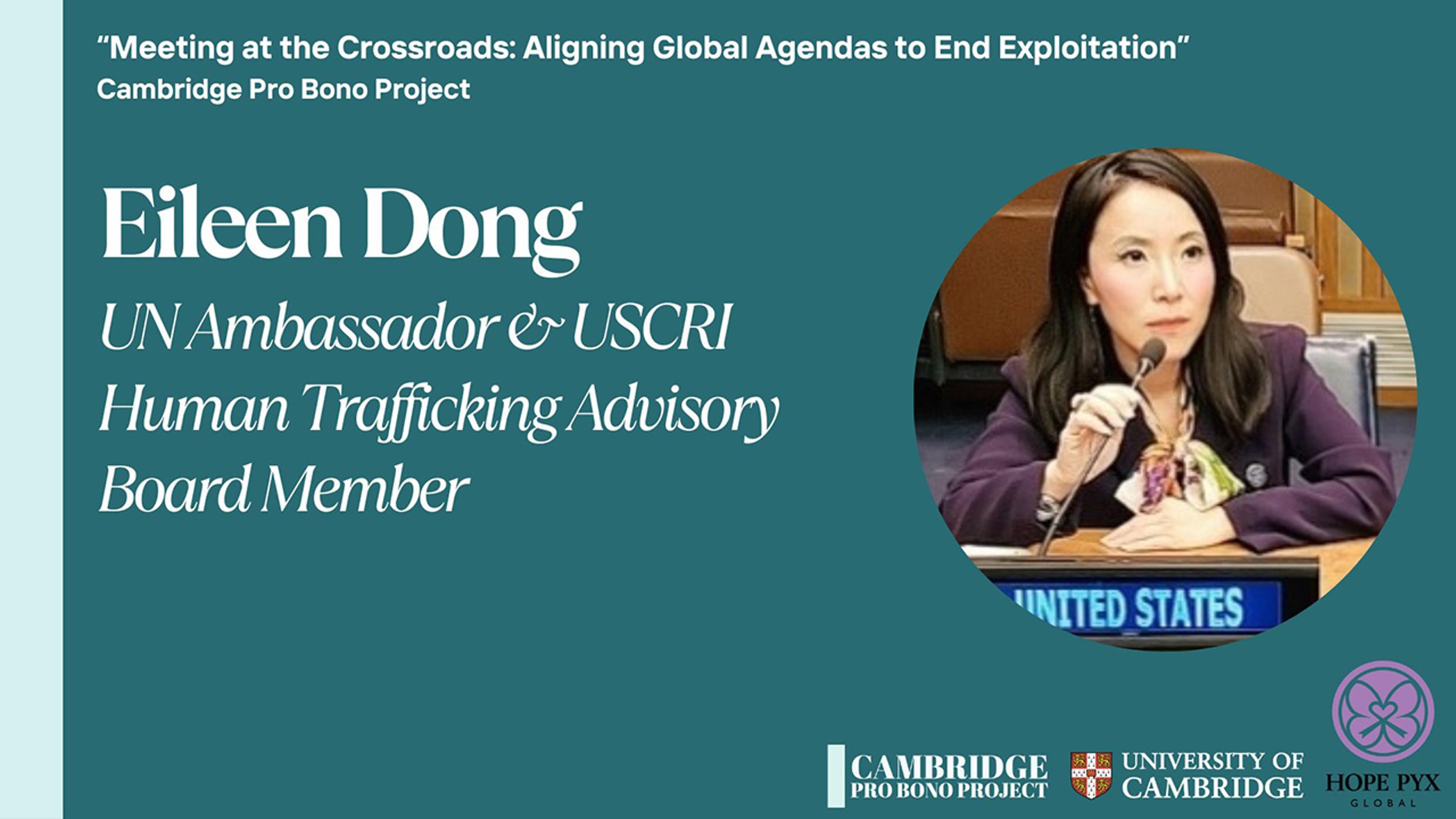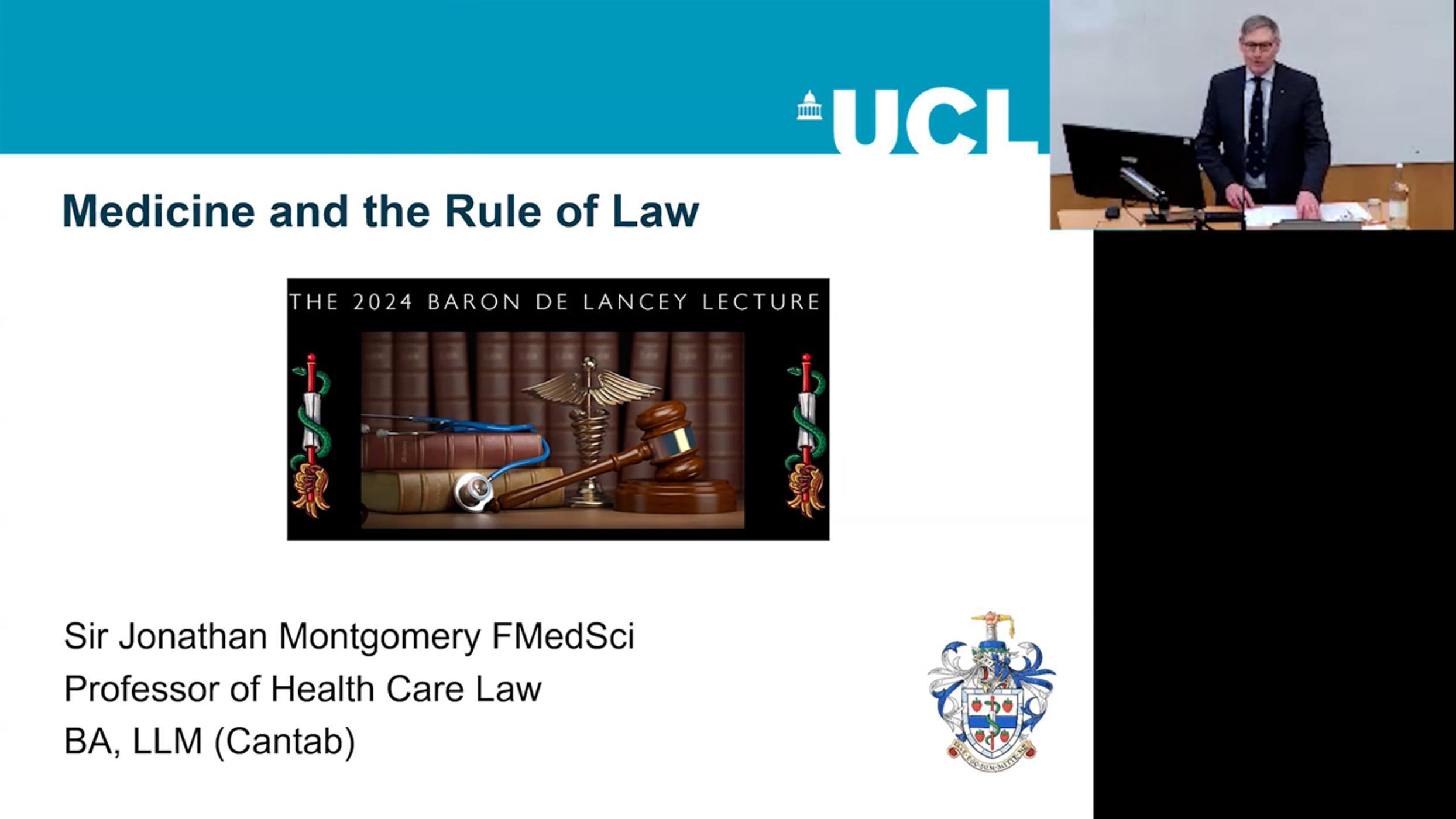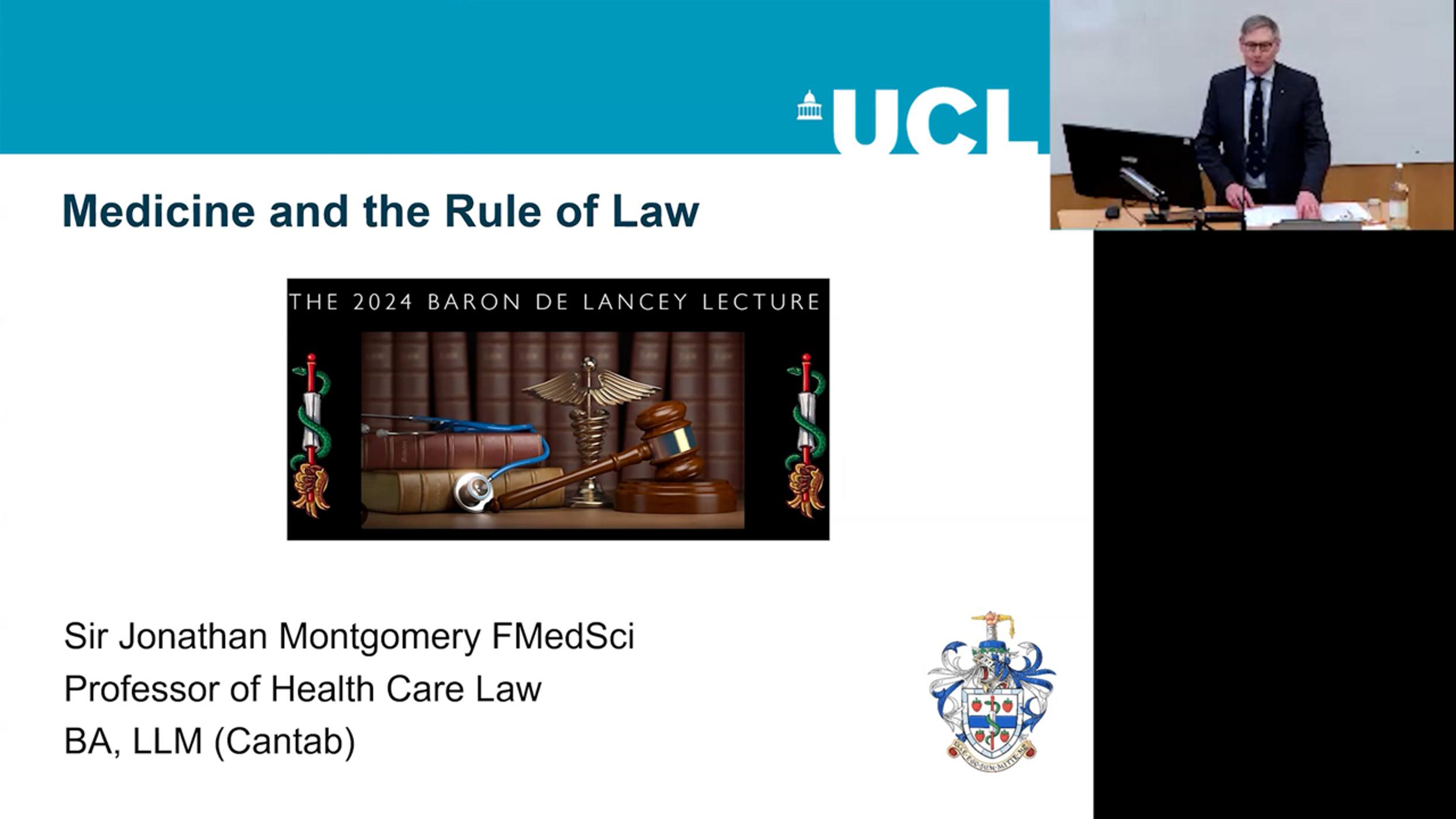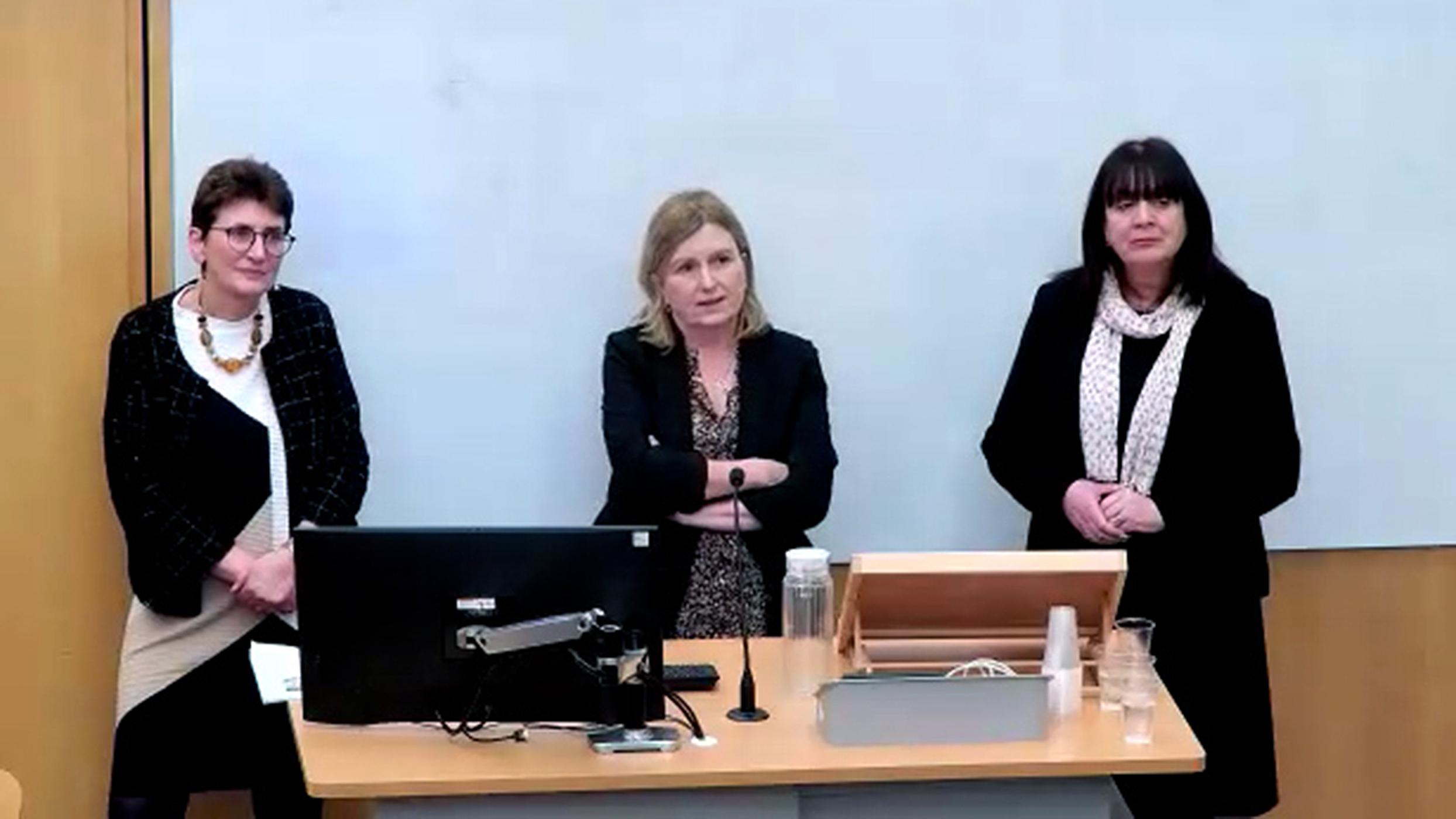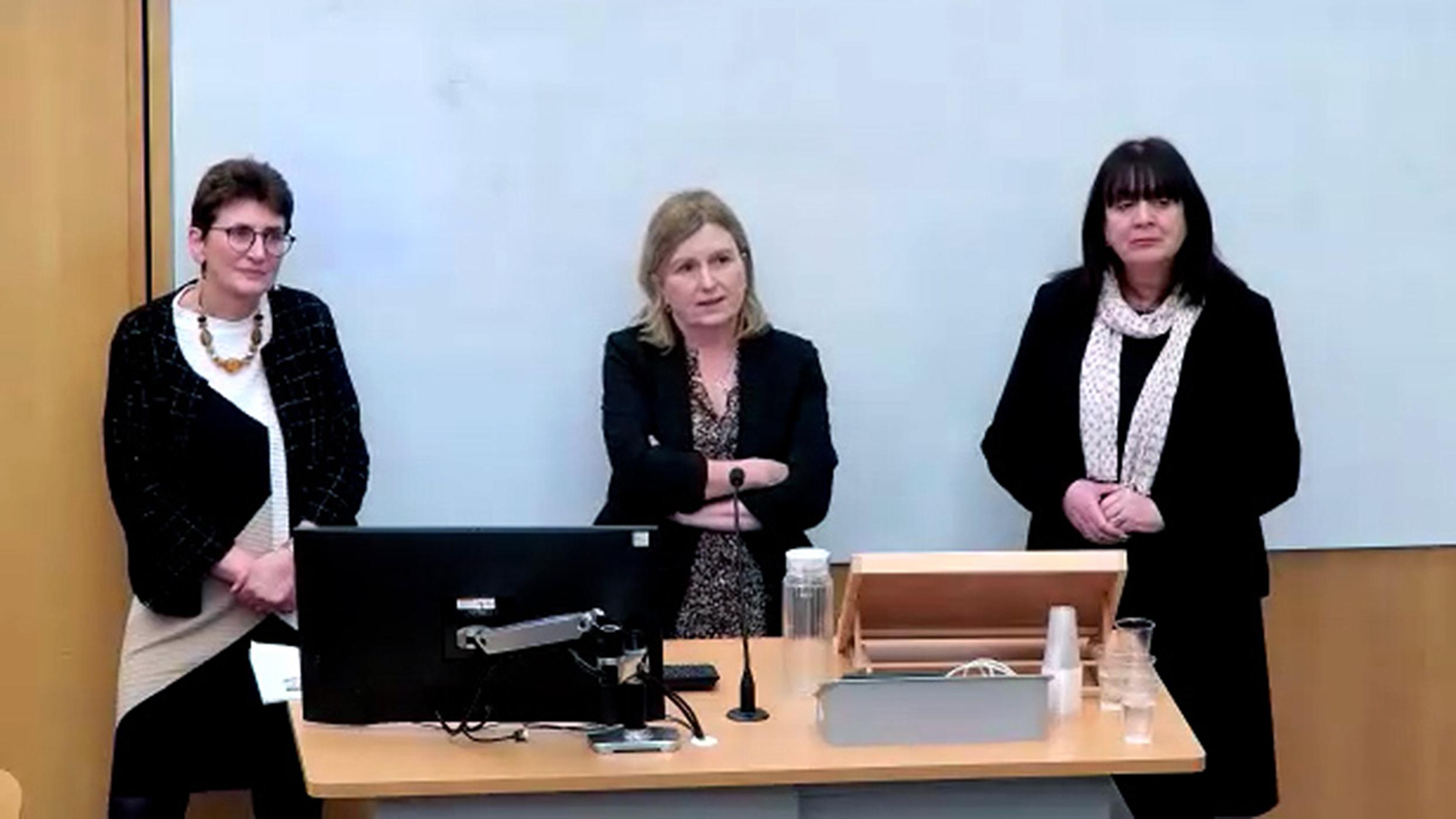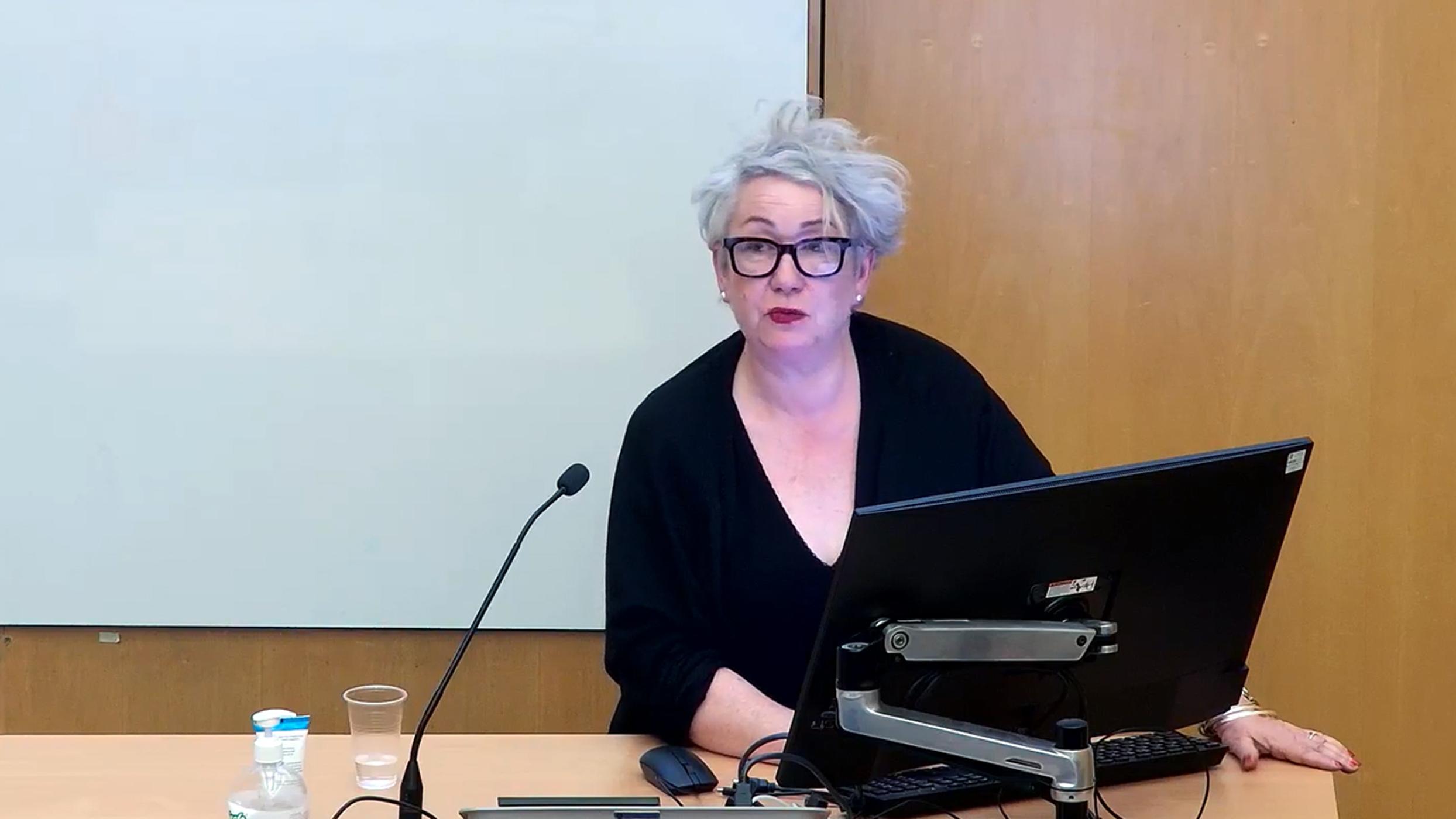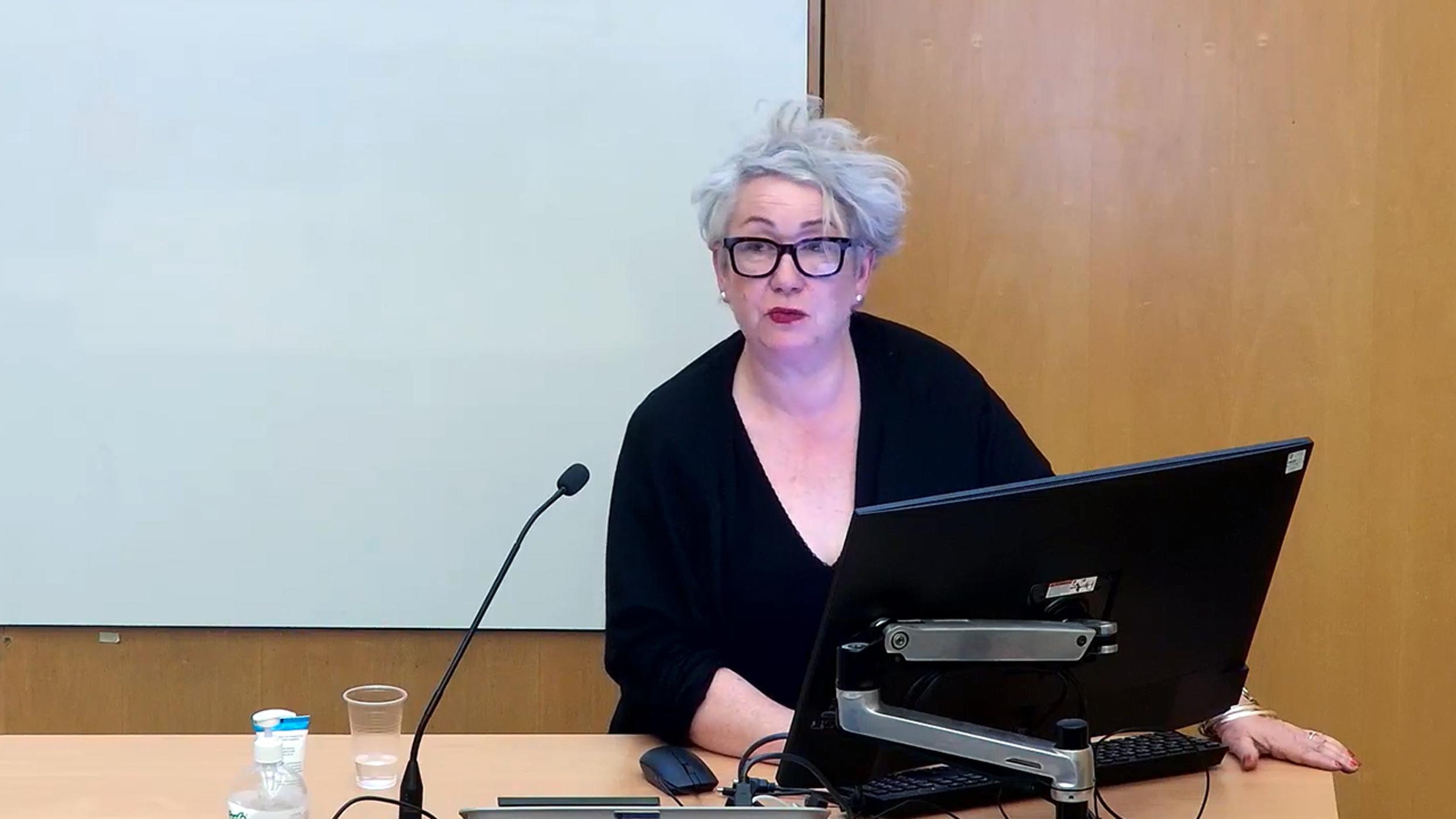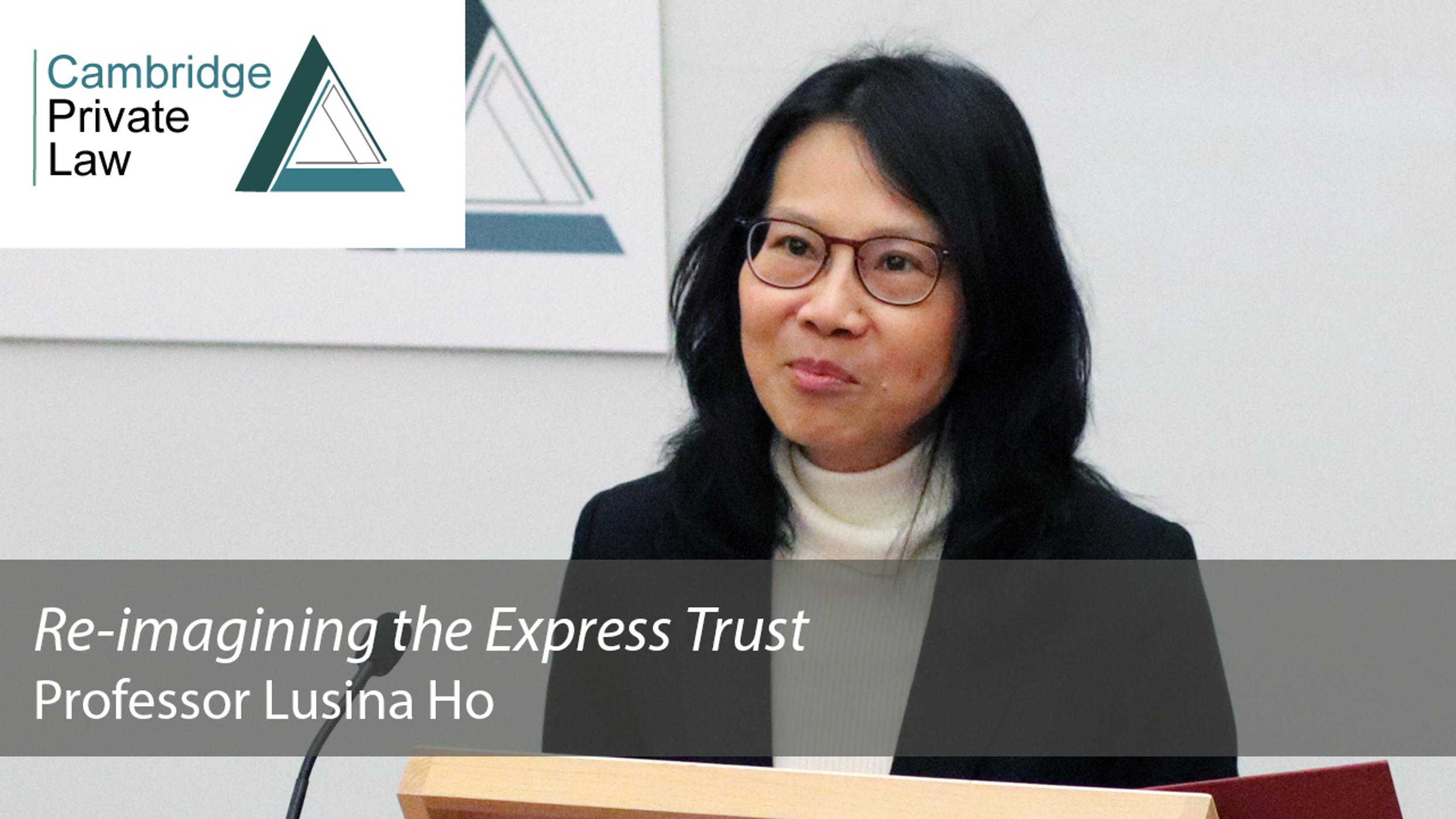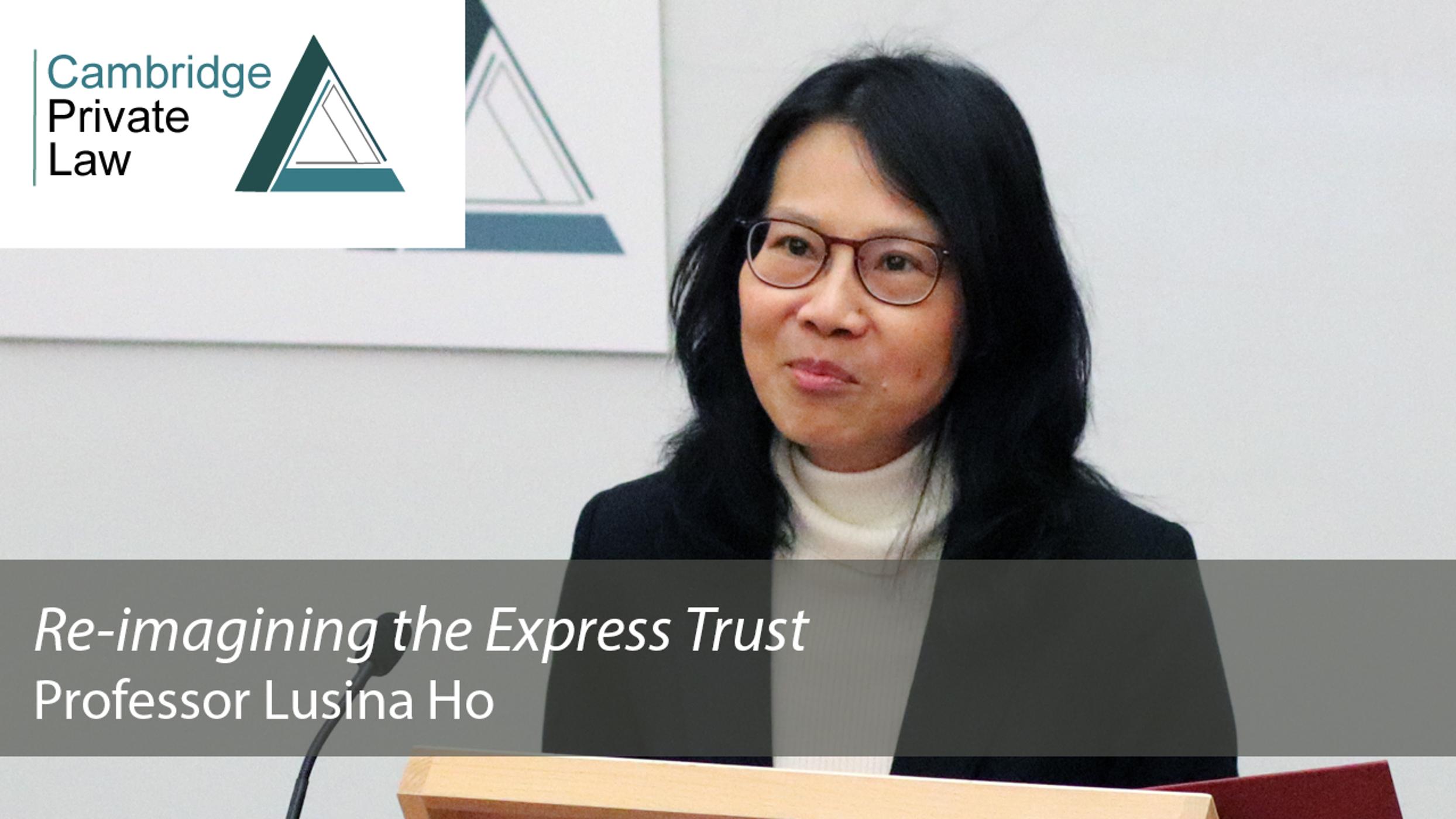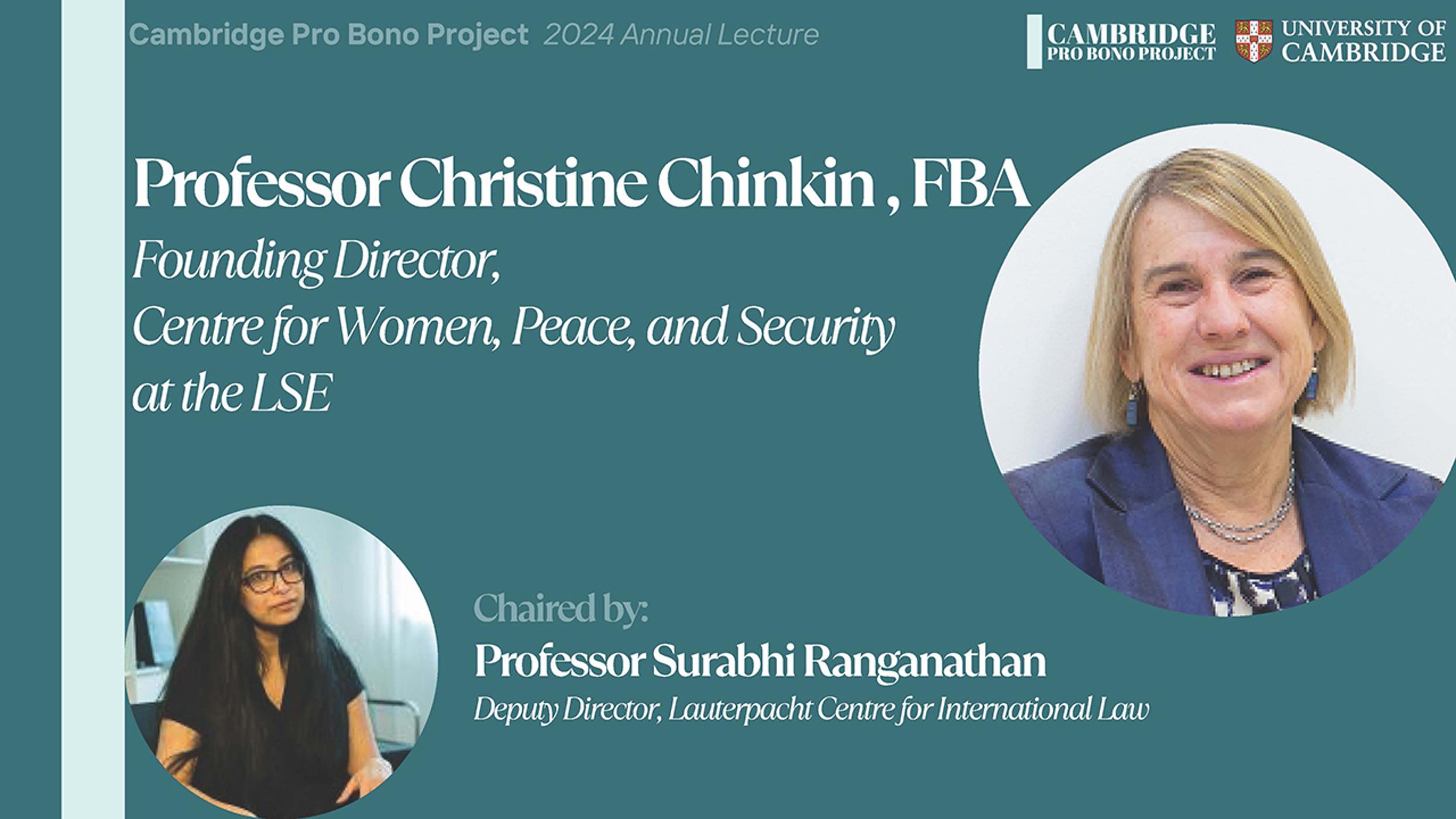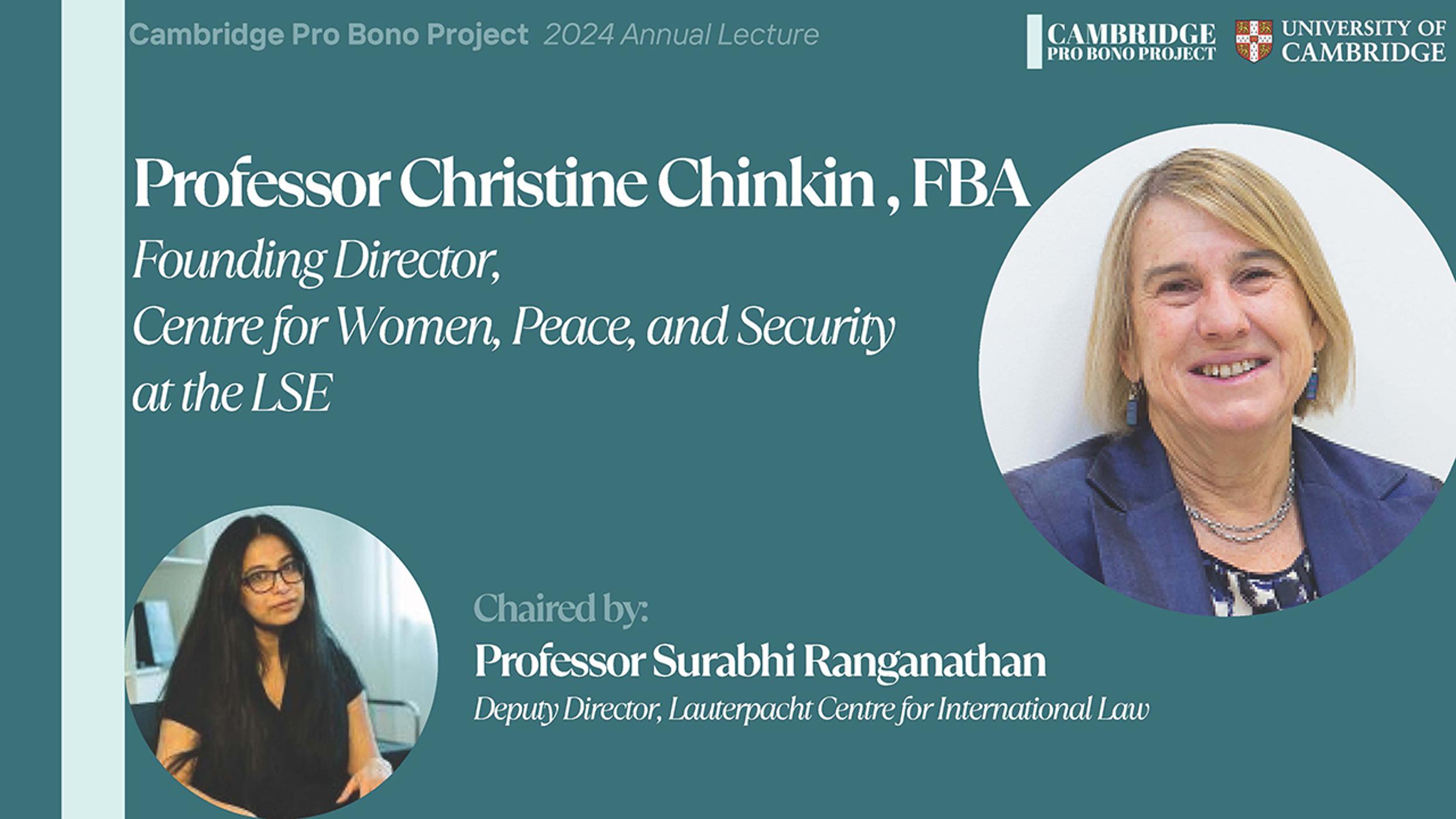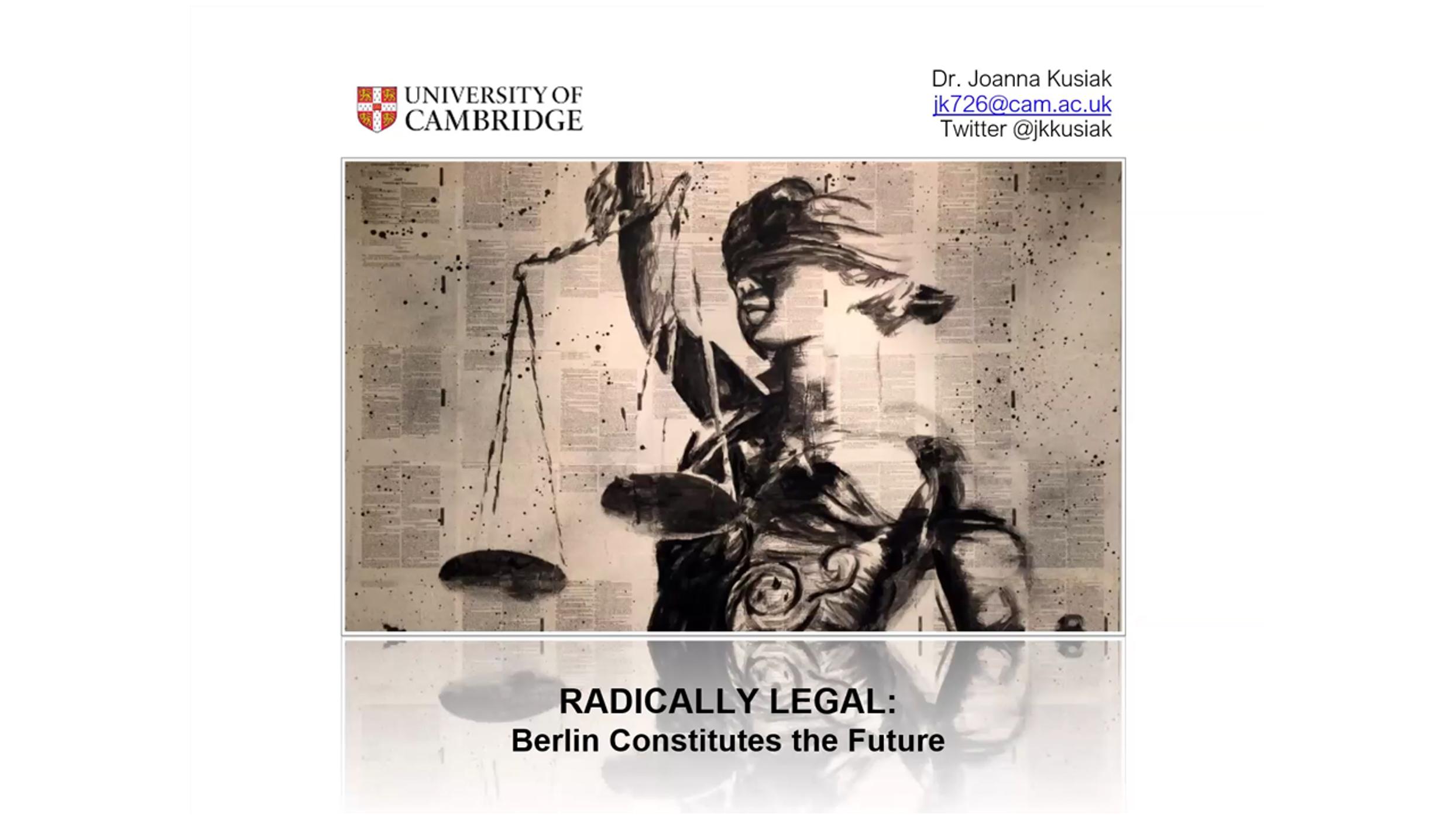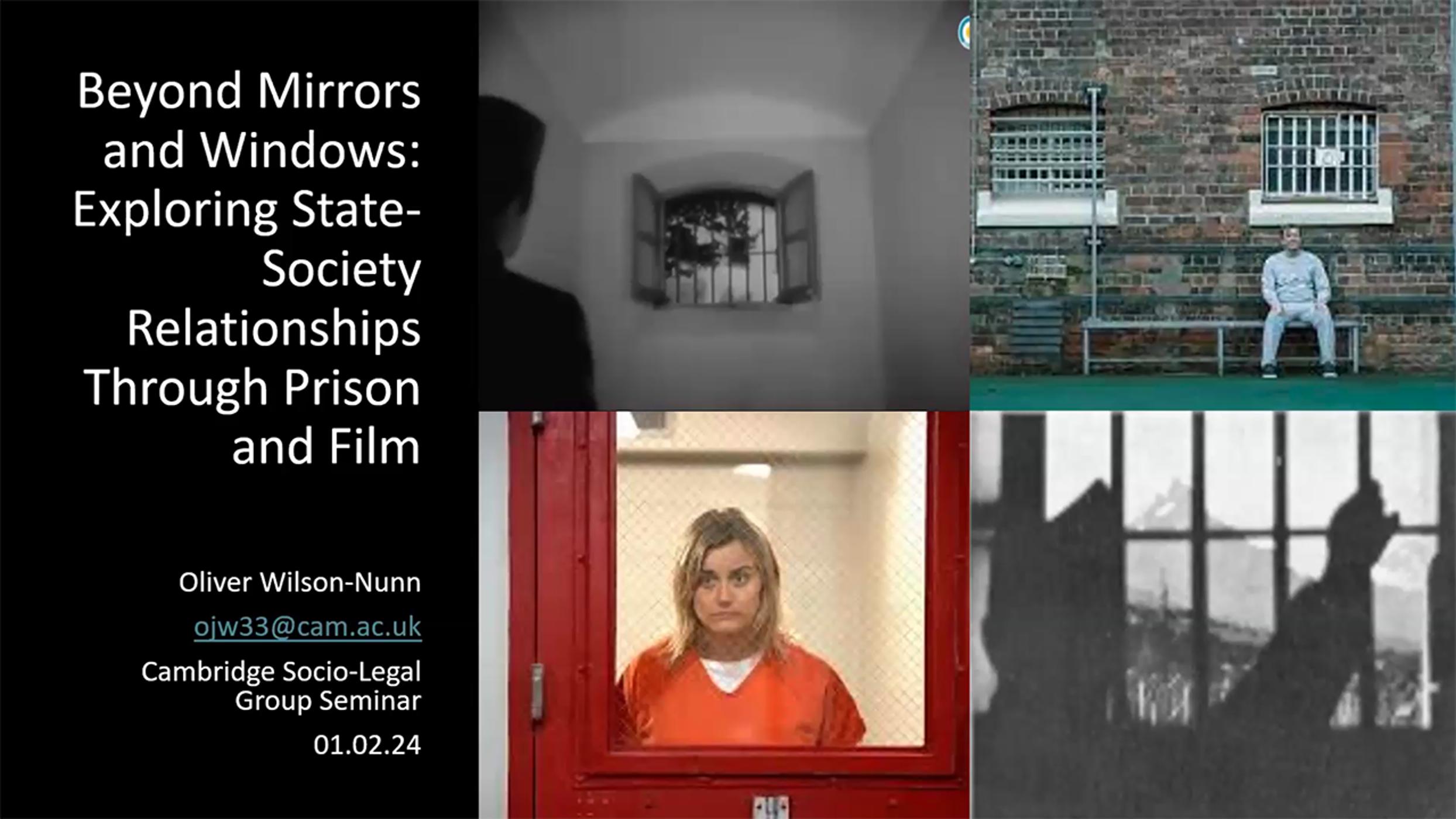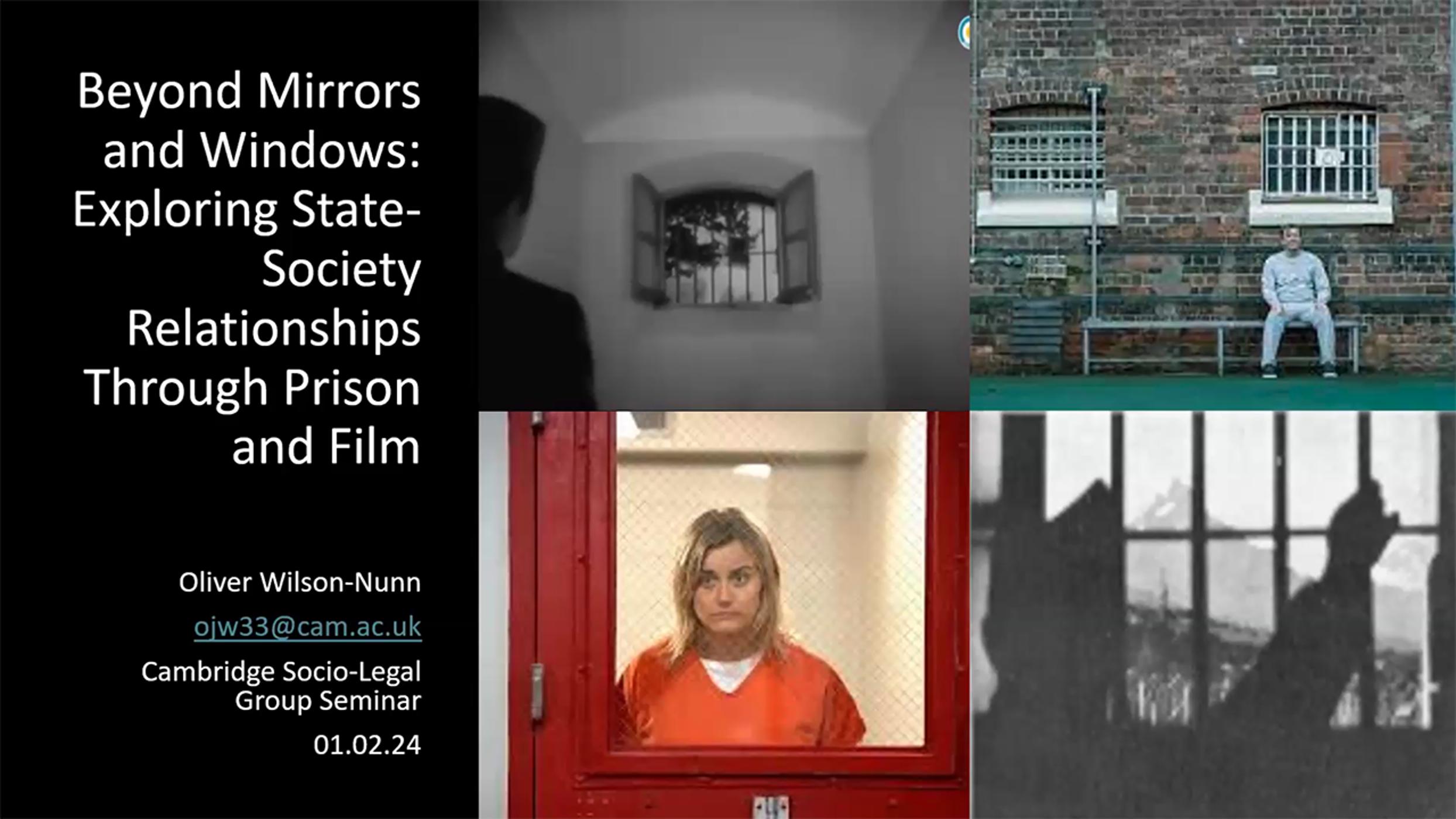Discover Cambridge Law: Public Lectures from the Faculty of Law
Cambridge Law: Public Lectures from the Faculty of Law

557 Episodes
Reverse
On Friday 18 October 2024, The Honourable Susan Mary Kiefel AC KC delivered the 2024 Sir David Williams Lecture entitled "Judicial review of discretionary decision-making: differences of approach".
The lecture begins at: 05:40
The Sir David Williams Lecture is an annual address delivered by a guest lecturer in honour of Sir David Williams, Emeritus Rouse Ball Professor of English Law and Emeritus Vice-Chancellor of Cambridge University.
More information about this lecture, including photographs from the event, is available from the Centre for Public Law website at:
https://www.cpl.law.cam.ac.uk/sir-david-williams-lectures
This entry provides an audio source for iTunes.
On Friday 18 October 2024, The Honourable Susan Mary Kiefel AC KC delivered the 2024 Sir David Williams Lecture entitled "Judicial review of discretionary decision-making: differences of approach".
The lecture begins at: 05:40
The Sir David Williams Lecture is an annual address delivered by a guest lecturer in honour of Sir David Williams, Emeritus Rouse Ball Professor of English Law and Emeritus Vice-Chancellor of Cambridge University.
More information about this lecture, including photographs from the event, is available from the Centre for Public Law website at:
https://www.cpl.law.cam.ac.uk/sir-david-williams-lectures
Cambridge Pro Bono Project hosted Eileen Dong at the Faculty of Law on Wednesday, 15 May 2024.
Eileen Dong, a renowned UN Ambassador, distinguished member of the US Committee for Refugees & Immigrants Advisory Board, and expert in combating human trafficking, will explore the critical intersections between UN’s 2030 Global Goals and the ongoing efforts to address gender-based violence and human trafficking. Drawing from her extensive experience and multidisciplinary approach, Ambassador Dong sheds light on the vital role of cross-sector collaborations in addressing human rights violations and gender-based violence.
Serving as the Founder and Executive Director of Hope Pyx Global as well as a consultant for US Center for Countering Human Trafficking, Homeland Security Investigations, Department of Justice, US Attorney’s Office, and US Citizenship and Immigration Services, Dong has committed her work to eliminating abuse, exploitation, trafficking, violence, and torture, while building safe spaces for survivors from all backgrounds. Dong's expertise has been recognized at prestigious events such as the UNODC World Day Against Trafficking in Persons and the OSCE Conference of the Alliance against Trafficking in Persons. Her innovative approaches encourage cross-sector, intergenerational, and multidisciplinary collaborations “glocally”.
Dong has played a pivotal role in advising on the UN's Declaration of Human Rights by the American Youth, aimed at eliminating abuse and exploitation, and participating in the Department of Homeland Security’s Roundtable, offering invaluable insights to enhance policies and programs in investigating human trafficking cases, as well as improving support for survivors. Furthermore, Dong successfully testified in favor of the passage of TX SB 49, resulting in almost tripling the crime victims’ compensation, and the allocation of $1 million for the first Trauma Recovery Center in Texas. Presently, she is engaged in collaborative efforts with international NGOs towards international treaties to end violence against women and girls.
For more information about the Cambridge Pro Bono Project, see them on Twitter (https://twitter.com/Cam_ProBono).
Additional resources:
Global Goals (Sustainable Development Goals): https://www.globalgoals.org/goals/
Core International Human Rights Treaties: https://www.ohchr.org/en/core-international-human-rights-instruments-and-their-monitoring-bodies
CEDAW Convention on the Elimination of All Forms of Discrimination against Women (un.org): https://www.un.org/womenwatch/daw/cedaw/
Book: "Thank Your Predator: A Guide to Trauma Recovery from Abuse": https://a.co/d/bIkDsuG
Polaris Project: Love and Trafficking: https://youtu.be/1RQTd6WeS2Q
TED Talk: Things You Don't Know about Human Trafficking | Eileen Dong: https://youtu.be/DVrwyvNUzMY?si=axpEJF73kUphK1px
To stay to updated on upcoming events and information: Eileen Dong: https://www.EileenDong.com
Hope Pyx Global: https://www.HopePyxGlobal.org
LinkedIn:
https://www.linkedin.com/in/eileen-dong/
https://www.linkedin.com/in/hope-pyx-global/
Cambridge Pro Bono Project hosted Eileen Dong at the Faculty of Law on Wednesday, 15 May 2024.
Eileen Dong, a renowned UN Ambassador, distinguished member of the US Committee for Refugees & Immigrants Advisory Board, and expert in combating human trafficking, will explore the critical intersections between UN’s 2030 Global Goals and the ongoing efforts to address gender-based violence and human trafficking. Drawing from her extensive experience and multidisciplinary approach, Ambassador Dong sheds light on the vital role of cross-sector collaborations in addressing human rights violations and gender-based violence.
Serving as the Founder and Executive Director of Hope Pyx Global as well as a consultant for US Center for Countering Human Trafficking, Homeland Security Investigations, Department of Justice, US Attorney’s Office, and US Citizenship and Immigration Services, Dong has committed her work to eliminating abuse, exploitation, trafficking, violence, and torture, while building safe spaces for survivors from all backgrounds. Dong's expertise has been recognized at prestigious events such as the UNODC World Day Against Trafficking in Persons and the OSCE Conference of the Alliance against Trafficking in Persons. Her innovative approaches encourage cross-sector, intergenerational, and multidisciplinary collaborations “glocally”.
Dong has played a pivotal role in advising on the UN's Declaration of Human Rights by the American Youth, aimed at eliminating abuse and exploitation, and participating in the Department of Homeland Security’s Roundtable, offering invaluable insights to enhance policies and programs in investigating human trafficking cases, as well as improving support for survivors. Furthermore, Dong successfully testified in favor of the passage of TX SB 49, resulting in almost tripling the crime victims’ compensation, and the allocation of $1 million for the first Trauma Recovery Center in Texas. Presently, she is engaged in collaborative efforts with international NGOs towards international treaties to end violence against women and girls.
For more information about the Cambridge Pro Bono Project, see them on Twitter (https://twitter.com/Cam_ProBono).
Additional resources:
Global Goals (Sustainable Development Goals): https://www.globalgoals.org/goals/
Core International Human Rights Treaties: https://www.ohchr.org/en/core-international-human-rights-instruments-and-their-monitoring-bodies
CEDAW Convention on the Elimination of All Forms of Discrimination against Women (un.org): https://www.un.org/womenwatch/daw/cedaw/
Book: "Thank Your Predator: A Guide to Trauma Recovery from Abuse": https://a.co/d/bIkDsuG
Polaris Project: Love and Trafficking: https://youtu.be/1RQTd6WeS2Q
TED Talk: Things You Don't Know about Human Trafficking | Eileen Dong: https://youtu.be/DVrwyvNUzMY?si=axpEJF73kUphK1px
To stay to updated on upcoming events and information: Eileen Dong: https://www.EileenDong.com
Hope Pyx Global: https://www.HopePyxGlobal.org
LinkedIn:
https://www.linkedin.com/in/eileen-dong/
https://www.linkedin.com/in/hope-pyx-global/
This entry provides an audio source for iTunes.
Professor Glanville Williams, Peter Glazebrooke, David Williams, and Dr Richard Sparks with Mr A F Wilcocks, previously Chief Constable of Hertfordshire, and author of 'Enforcing the Law with Discretion'.
On 9th April 2024 the European Court of Human Rights delivered Grand Chamber rulings in three cases relating to climate change:
Carême v. France - https://hudoc.echr.coe.int/eng?i=001-233261
Duarte Agostinho and Others v. Portugal and 32 Others - https://hudoc.echr.coe.int/eng?i=001-233174
Verein KlimaSeniorinnen Schweiz and Others v. Switzerland - https://hudoc.echr.coe.int/eng?i=001-233206
In this video, Dr Stefan Theil discusses the extent to which the ECHR is prepared to dictate how countries might implement their own climate change policies.
Stefan Theil is Assistant Professor in Public Law and a Fellow and Director of Studies at Sidney Sussex College. In Stefan's recent book 'Towards the Environmental Minimum' (Cambridge University Press, 2021) he argues for the recognition of a comprehensive framework that addresses the relationship between human rights and environmental harm.
For more information about Dr Theil, please refer to his profile at:
https://www.law.cam.ac.uk/people/academic/s-theil/6578
Law in Focus is a collection of short videos featuring academics from the University of Cambridge Faculty of Law, addressing legal issues in current affairs and the news. These issues are examples of the many which challenge researchers and students studying undergraduate and postgraduate law at the Faculty.
This entry provides an audio source for iTunes.
On 9th April 2024 the European Court of Human Rights delivered Grand Chamber rulings in three cases relating to climate change:
Carême v. France - https://hudoc.echr.coe.int/eng?i=001-233261
Duarte Agostinho and Others v. Portugal and 32 Others - https://hudoc.echr.coe.int/eng?i=001-233174
Verein KlimaSeniorinnen Schweiz and Others v. Switzerland - https://hudoc.echr.coe.int/eng?i=001-233206
In this video, Dr Stefan Theil discusses the extent to which the ECHR is prepared to dictate how countries might implement their own climate change policies.
Stefan Theil is Assistant Professor in Public Law and a Fellow and Director of Studies at Sidney Sussex College. In Stefan's recent book 'Towards the Environmental Minimum' (Cambridge University Press, 2021) he argues for the recognition of a comprehensive framework that addresses the relationship between human rights and environmental harm.
For more information about Dr Theil, please refer to his profile at:
https://www.law.cam.ac.uk/people/academic/s-theil/6578
Law in Focus is a collection of short videos featuring academics from the University of Cambridge Faculty of Law, addressing legal issues in current affairs and the news. These issues are examples of the many which challenge researchers and students studying undergraduate and postgraduate law at the Faculty.
Baron Cornelius Ver Heyden de Lancey (1889-1984) was a wealthy and public-spirited Dutchman who at different times in his life was a dentist, doctor, surgeon, barrister and art historian. In 1970 he created the De Lancey and De La Hanty Foundation, to promote studies in medico-legal topics. The Foundation generously gave Cambridge the Ver Heyden de Lancey Fund, which since 1996 has funded occasional public lectures on medico-legal issues of current interest.
The 2024 Baron Ver Heyden de Lancey Lecture on Medico-Legal Studies was delivered by Professor Sir Jonathan Montgomery of University College London on 21 March 2024, and was entitled "Medicine and the Rule of Law".
For more information about the Baron Ver Heyden de Lancey Lecture series, please see:
http://www.lml.law.cam.ac.uk/events/vhdl-events
Baron Cornelius Ver Heyden de Lancey (1889-1984) was a wealthy and public-spirited Dutchman who at different times in his life was a dentist, doctor, surgeon, barrister and art historian. In 1970 he created the De Lancey and De La Hanty Foundation, to promote studies in medico-legal topics. The Foundation generously gave Cambridge the Ver Heyden de Lancey Fund, which since 1996 has funded occasional public lectures on medico-legal issues of current interest.
The 2024 Baron Ver Heyden de Lancey Lecture on Medico-Legal Studies was delivered by Professor Sir Jonathan Montgomery of University College London on 21 March 2024, and was entitled "Medicine and the Rule of Law".
For more information about the Baron Ver Heyden de Lancey Lecture series, please see:
http://www.lml.law.cam.ac.uk/events/vhdl-events
This entry provides an audio source for iTunes.
This event was hosted by Cambridge Family Law Centre (CFL) on 7 March 2024.
Speakers: Professor Laura Lundy (Queen’s University Belfast), Professor Anne Barlow (University of Exeter) & Dr Jan Ewing (University of Cambridge)
When parents separate, children have the right to a voice in the decision-making per their article 12, UNCRC rights. However, evidence shows that this right is rarely upheld in England and Wales.
Professor Lundy has developed the ‘Lundy Model of Child Participation’ (‘the Lundy Model’), a core set of rights-based principles to ensure young people can participate meaningfully in decision-making. The model is core to the Irish National Framework on Child and Youth Participation. It has been adopted internationally, by the European Commission, World Health Organisation, World Vision and UNICEF.
Professor Lundy presents the Lundy Model and Professor Barlow and Dr Ewing presents the findings of empirical research from the Wellcome Trust Centre-funded, ‘HeaRT Project’ to consider the extent to which child-inclusive mediation as currently practised in England and Wales is compliant with their article 12 rights and the mental health and well-being benefits to young people when they are given space, voice, audience and influence per the Lundy Model in child-inclusive mediation.
For more about CFL see:
https://www.family.law.cam.ac.uk/
This entry provides an audio source for iTunes.
This event was hosted by Cambridge Family Law Centre (CFL) on 7 March 2024.
Speakers: Professor Laura Lundy (Queen’s University Belfast), Professor Anne Barlow (University of Exeter) & Dr Jan Ewing (University of Cambridge)
When parents separate, children have the right to a voice in the decision-making per their article 12, UNCRC rights. However, evidence shows that this right is rarely upheld in England and Wales.
Professor Lundy has developed the ‘Lundy Model of Child Participation’ (‘the Lundy Model’), a core set of rights-based principles to ensure young people can participate meaningfully in decision-making. The model is core to the Irish National Framework on Child and Youth Participation. It has been adopted internationally, by the European Commission, World Health Organisation, World Vision and UNICEF.
Professor Lundy presents the Lundy Model and Professor Barlow and Dr Ewing presents the findings of empirical research from the Wellcome Trust Centre-funded, ‘HeaRT Project’ to consider the extent to which child-inclusive mediation as currently practised in England and Wales is compliant with their article 12 rights and the mental health and well-being benefits to young people when they are given space, voice, audience and influence per the Lundy Model in child-inclusive mediation.
For more about CFL see:
https://www.family.law.cam.ac.uk/
Cambridge University Human Rights Law Society hosted their speakers' event with Clare Wade KC on 23rd February 2024, titled 'Re-framing the legal landscape in domestic homicide.'
Clare Wade KC is on the advisory committee for research into women who kill, commissioned by the Centre for Women's Justice. She was appointed Independent Reviewer on domestic homicide and recently published the Domestic Homicide Sentencing Review. She will be discussing her work on this, in which she made several recommendations for amendment to the current manslaughter guidelines to offer greater protection for victims of domestic violence. She will be discussing her recommendations and the recent package of government reforms released in response to these in 2023.
Clare has also been counsel on several landmark cases, including the Sally Challen case which paved the way for the Court of Appeal to consider coercive control as a partial defence to murder for victims of domestic abuse. Clare has also received multiple accolades including 'Barrister of the Year' at the Women in Law Awards 2020, is ranked a Tier 1 criminal barrister, and was shortlisted for Crime Silk of the Year 2020 by the Legal 500.
For more information about CUHRLS:
https://www.facebook.com/CUHRLS
This entry provides an audio source for iTunes.
Cambridge University Human Rights Law Society hosted their speakers' event with Clare Wade KC on 23rd February 2024, titled 'Re-framing the legal landscape in domestic homicide.'
Clare Wade KC is on the advisory committee for research into women who kill, commissioned by the Centre for Women's Justice. She was appointed Independent Reviewer on domestic homicide and recently published the Domestic Homicide Sentencing Review. She will be discussing her work on this, in which she made several recommendations for amendment to the current manslaughter guidelines to offer greater protection for victims of domestic violence. She will be discussing her recommendations and the recent package of government reforms released in response to these in 2023.
Clare has also been counsel on several landmark cases, including the Sally Challen case which paved the way for the Court of Appeal to consider coercive control as a partial defence to murder for victims of domestic abuse. Clare has also received multiple accolades including 'Barrister of the Year' at the Women in Law Awards 2020, is ranked a Tier 1 criminal barrister, and was shortlisted for Crime Silk of the Year 2020 by the Legal 500.
For more information about CUHRLS:
https://www.facebook.com/CUHRLS
On 23 February 2024 Professor Lusina Ho (University of Hong Kong) delivered the 2024 Cambridge Freshfields Lecture entitled "Re-imagining the Express Trust".
Lusina Ho is Harold Hsiao-Wo Lee Professor in Trust and Equity at the Faculty of Law, the University of Hong Kong. While pursuing her teaching and research in Trust, Restitution, and Comparative Trust Law (in particular Chinese Trust Law), she has been consulted by the Government of the People’s Republic of China on the enactment of the Chinese Trust Law and the Government of the Hong Kong SAR on the reform of the Trustee Ordinance. In 2019, she has successfully convinced the Hong Kong SAR Government to launch a trust service for special needs individuals in the territory.
She has published widely and her work has been cited in highest appellate courts in common law jurisdictions, and has been translated and published in Japanese. She received from HKU the Outstanding Young Researcher Award in 2006, the Faculty Outstanding Teaching Award in 2017, the Faculty Knowledge Exchange Award in 2018, and the University Knowledge Award in 2018.
Timings:
- Professor Lionel Smith - Introduction: 0:00
- Dr Sinead Agnew - Introduction: 4:23
- Professor Lusina Ho: 7:00
- Dr Brian Sloan - Thanks: 50:15
The Cambridge Freshfields Lecture is an annual address delivered by a guest of the Cambridge Private Law Centre, and the event is sponsored by Freshfields Bruckhaus Deringer.
More information about this lecture, including a transcript and photographs from the event, is available from the Private Law Centre website:
https://www.privatelaw.law.cam.ac.uk/events/CambridgeFreshfieldsLecture
On 23 February 2024 Professor Lusina Ho (University of Hong Kong) delivered the 2024 Cambridge Freshfields Lecture entitled "Re-imagining the Express Trust".
Lusina Ho is Harold Hsiao-Wo Lee Professor in Trust and Equity at the Faculty of Law, the University of Hong Kong. While pursuing her teaching and research in Trust, Restitution, and Comparative Trust Law (in particular Chinese Trust Law), she has been consulted by the Government of the People’s Republic of China on the enactment of the Chinese Trust Law and the Government of the Hong Kong SAR on the reform of the Trustee Ordinance. In 2019, she has successfully convinced the Hong Kong SAR Government to launch a trust service for special needs individuals in the territory.
She has published widely and her work has been cited in highest appellate courts in common law jurisdictions, and has been translated and published in Japanese. She received from HKU the Outstanding Young Researcher Award in 2006, the Faculty Outstanding Teaching Award in 2017, the Faculty Knowledge Exchange Award in 2018, and the University Knowledge Award in 2018.
Timings:
- Professor Lionel Smith - Introduction: 0:00
- Dr Sinead Agnew - Introduction: 4:23
- Professor Lusina Ho: 7:00
- Dr Brian Sloan - Thanks: 50:15
The Cambridge Freshfields Lecture is an annual address delivered by a guest of the Cambridge Private Law Centre, and the event is sponsored by Freshfields Bruckhaus Deringer.
More information about this lecture, including a transcript and photographs from the event, is available from the Private Law Centre website:
https://www.privatelaw.law.cam.ac.uk/events/CambridgeFreshfieldsLecture
This entry provides an audio source for iTunes.
The Cambridge Pro Bono Project (CPP) hosted the annual lecture featuring Professor Christine Chinkin, FBA.
The Cambridge Pro Bono Project is a research centre that draws on the subject-matter expertise of graduate researchers and Faculty experts to produce reports on a wide range of public interest matters. Every year, we invite distinguished speakers to address our researchers, staff, and students at the University of Cambridge. This year's Cambridge Pro Bono Project Annual Lecture will be delivered by Professor Christine Chinkin and chaired by Professor Surabhi Ranganathan, Professor of International Law and Deputy Director of the Lauterpacht Centre for International Law.
Professor Chinkin, FBA is the founding Director of the Centre for Women, Peace, and Security and Emeritus Professor of International Law at the London School of Economics and Political Science. During her illustrious career, she has served on the Human Rights Advisory Panel established by UNMIK in Kosovo and as Scientific Advisor to the Council of Europe’s Committee for the drafting of the Convention on Preventing and Combating Violence against Women and Domestic Violence. She is Chair of the International Law Association.
In commemorating the recent 75th anniversary of the Universal Declaration of Human Rights, Professor Chinkin will speak to how human rights law has engaged with women as subjects and agents in international law, with a focus on the women, peace and security context. She will share her valuable insights into the historical challenges, current opportunities, and the anticipated contributions of practitioners, academics, and researchers.
The Cambridge Pro Bono Project (CPP) hosted the annual lecture featuring Professor Christine Chinkin, FBA.
The Cambridge Pro Bono Project is a research centre that draws on the subject-matter expertise of graduate researchers and Faculty experts to produce reports on a wide range of public interest matters. Every year, we invite distinguished speakers to address our researchers, staff, and students at the University of Cambridge. This year's Cambridge Pro Bono Project Annual Lecture will be delivered by Professor Christine Chinkin and chaired by Professor Surabhi Ranganathan, Professor of International Law and Deputy Director of the Lauterpacht Centre for International Law.
Professor Chinkin, FBA is the founding Director of the Centre for Women, Peace, and Security and Emeritus Professor of International Law at the London School of Economics and Political Science. During her illustrious career, she has served on the Human Rights Advisory Panel established by UNMIK in Kosovo and as Scientific Advisor to the Council of Europe’s Committee for the drafting of the Convention on Preventing and Combating Violence against Women and Domestic Violence. She is Chair of the International Law Association.
In commemorating the recent 75th anniversary of the Universal Declaration of Human Rights, Professor Chinkin will speak to how human rights law has engaged with women as subjects and agents in international law, with a focus on the women, peace and security context. She will share her valuable insights into the historical challenges, current opportunities, and the anticipated contributions of practitioners, academics, and researchers.
This entry provides an audio source for iTunes.
Speaker: Joanna Kusiak, Junior Research Fellow in Urban Studies at King’s College
Bio: Dr Joanna Kusiak is a scholar-activist who works at the University of Cambridge. Born in Poland, she has been shaped by the emancipatory tradition of the Solidarność movement and by the brutality of the neoliberal transformation. Her work focuses on urban land, housing crises, and the progressive potential of law. In 2021 she was one of the spokespeople of Deutsche Wohnen & Co enteignen, Berlin’s successful referendum campaign to expropriate stock-listed landlords. She is the winner of the 2023 Nine Dots Prize for ’thinking about the box’ about contemporary social challenges. Her winning book ‘Radically Legal: Berlin Constitutes the Future’ will appear in May 2023 in Cambridge University Press.
Do we need a revolution to save our cities from the rampant housing crisis? Yes – but this revolution is powered by the law. Right in the middle of the German constitution, a group of ordinary citizen discovers a forgotten clause that allows them to take 240.000 homes back from multi-billion corporations. My talk describes the story of a grassroots movement that convinced one million Berliners to pop the speculative housing bubble a design a new institutional model for managing urban housing.
For more about the Cambridge Socio-Legal Group see:
https://www.law.cam.ac.uk/researchfaculty-centres-networks-and-groups/cambridge-socio-legal-group
This entry provides an audio source for iTunes.
Speaker: Oliver Wilson-Nunn
Bio: Oliver Wilson-Nunn is an Isaac Newton Research Fellow at Robinson College, University of Cambridge. He recently completed his PhD on prison and film in Argentina at the Centre of Latin American Studies, University of Cambridge. He has published on prison education in contemporary documentary film and on prison writing from Cuba. He is broadly interested in the relationship between law, criminal justice, and culture in Latin America, with his new project focussing on the relationship between contemporary documentary cinema and the processes of judicialisation and juridification.
Prison, the cliché goes, serves as a mirror of society. Films about prison, according to a similarly clichéd logic, serve as a window onto that mirror of society. In this presentation, I move beyond this focus on reflection and refraction to propose a more materially sensitive approach to what prison-based films can tell us about state and society. I reflect on the institutional relationships between the film industry and prisons to show how the very production and exhibition of film—not just the symbolic force of the image itself—reconfigure the relationships between imprisoned people, non-imprisoned people, and the state. Focussing on Argentina, I consider examples of location shooting inside operational prisons, the use of imprisoned people as actors, and the exhibition of film inside prison from the 1930s through to the present day to trouble a tendency among academic lawyers, criminologists, and film scholars to evaluate prison films in terms of their ‘accurate’ or ‘inaccurate’ representation of real-life prisons. By shifting our focus from the truth value of the strictly defined ‘prison film’ towards the broader social relationships produced at the institutional interstice of prison and film, we can better understand prison, following Ruth Wilson Gilmore, not as a ‘building “over there” but a set of relationships that undermine rather than stabilize everyday lives everywhere’ (2007, 242).
The Cambridge Socio-Legal Group organises and supports events and publications relating to socio-legal research, drawing participants from within the University of Cambridge and around the world. For more about the CSLG, see:
https://www.law.cam.ac.uk/researchfaculty-centres-networks-and-groups/cambridge-socio-legal-group
The CSLG organises and supports events and publications relating to socio-legal research, drawing participants from within the University of Cambridge and around the world. A donation would be instrumental in allowing the Cambridge Socio-Legal Group to continue its cross-disciplinary work:
https://www.philanthropy.cam.ac.uk/give-to-cambridge/the-cambridge-socio-legal-group
Speaker: Oliver Wilson-Nunn
Bio: Oliver Wilson-Nunn is an Isaac Newton Research Fellow at Robinson College, University of Cambridge. He recently completed his PhD on prison and film in Argentina at the Centre of Latin American Studies, University of Cambridge. He has published on prison education in contemporary documentary film and on prison writing from Cuba. He is broadly interested in the relationship between law, criminal justice, and culture in Latin America, with his new project focussing on the relationship between contemporary documentary cinema and the processes of judicialisation and juridification.
Prison, the cliché goes, serves as a mirror of society. Films about prison, according to a similarly clichéd logic, serve as a window onto that mirror of society. In this presentation, I move beyond this focus on reflection and refraction to propose a more materially sensitive approach to what prison-based films can tell us about state and society. I reflect on the institutional relationships between the film industry and prisons to show how the very production and exhibition of film—not just the symbolic force of the image itself—reconfigure the relationships between imprisoned people, non-imprisoned people, and the state. Focussing on Argentina, I consider examples of location shooting inside operational prisons, the use of imprisoned people as actors, and the exhibition of film inside prison from the 1930s through to the present day to trouble a tendency among academic lawyers, criminologists, and film scholars to evaluate prison films in terms of their ‘accurate’ or ‘inaccurate’ representation of real-life prisons. By shifting our focus from the truth value of the strictly defined ‘prison film’ towards the broader social relationships produced at the institutional interstice of prison and film, we can better understand prison, following Ruth Wilson Gilmore, not as a ‘building “over there” but a set of relationships that undermine rather than stabilize everyday lives everywhere’ (2007, 242).
The Cambridge Socio-Legal Group organises and supports events and publications relating to socio-legal research, drawing participants from within the University of Cambridge and around the world. For more about the CSLG, see:
https://www.law.cam.ac.uk/researchfaculty-centres-networks-and-groups/cambridge-socio-legal-group
The CSLG organises and supports events and publications relating to socio-legal research, drawing participants from within the University of Cambridge and around the world. A donation would be instrumental in allowing the Cambridge Socio-Legal Group to continue its cross-disciplinary work:
https://www.philanthropy.cam.ac.uk/give-to-cambridge/the-cambridge-socio-legal-group
This entry provides an audio source for iTunes.
Comments
Top Podcasts
The Best New Comedy Podcast Right Now – June 2024The Best News Podcast Right Now – June 2024The Best New Business Podcast Right Now – June 2024The Best New Sports Podcast Right Now – June 2024The Best New True Crime Podcast Right Now – June 2024The Best New Joe Rogan Experience Podcast Right Now – June 20The Best New Dan Bongino Show Podcast Right Now – June 20The Best New Mark Levin Podcast – June 2024
 United States
United States

